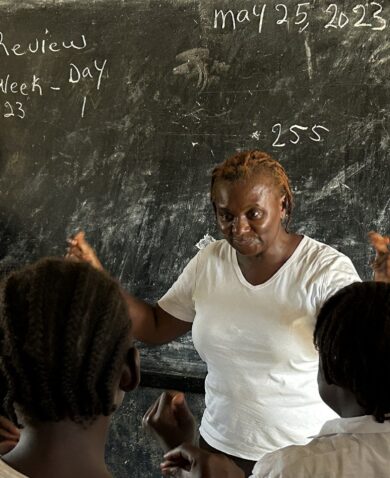Participants left the retreat energized and committed, and Mrs. Sakala pledged to hold each province accountable for its commitment. To support the ministry in consolidating this commitment, STEP-Up facilitated a series of participatory strategic planning reviews in each province and district.
The head teacher of Mudanyama Community School, Mr. Katumoya, attended the Mwinilunga District strategic planning meeting and has been working with his staff to apply the new strategies. Their success with students like Haward has been the result of strategies such as using advanced students as peer mentors, holding reading competitions, using flash cards, and teaching writing using the New Breakthrough to Literacy word spacing method.
STEP-Up’s staff are helping educators like Mr. Katumoya understand that achieving the ambitious reading targets requires setting simple goals first, such as ensuring that pupils learn to write their names by the end of the first term of Grade 1.
In Zambia’s Eastern Province, STEP-Up helped the government revise its education strategic plan to emphasize learner performance. Provincial Education Officer Thomas Mwanza reports that educators were not accustomed to linking their priorities to student performance.
“It was not uncommon for head teachers to know nothing about how their pupils were experiencing education,” he said. “Imagine then how a head teacher who is blind to such realities is managing the school. What kind of decisions are they making, what kind of guidance are they offering the teachers?”
With the province’s revised strategic plan as a guide to strengthening evidence-based decision-making, Mr. Mwanza and his staff have been mentoring head teachers to understand and monitor their school’s performance and to use data to make informed decisions that appropriately address problems. There are already signs that head teachers are coming on board.
“We’ve told the head teachers to produce reports and keep these reports on their desks. Walk into a school today and you’ll find the head teacher ready to tell you how many pupils are failing and the reasons. This wasn’t the case in the recent past. Remarkably, many head teachers even have reports on the reading levels in their classrooms,” Mr. Mwanza said.
Knowledge informs planning and action; where there is a gap supported by the numbers, a head teacher, district supervisor, or provincial education officer can explore the causes and make adjustments. In that way, data about reading connects everyone in the system, and everyone works from the same information. STEP-Up Zambia is now supporting district strategic planning to help translate a common vision for education into concrete plans to improve the reading skills of Zambia’s students.





























